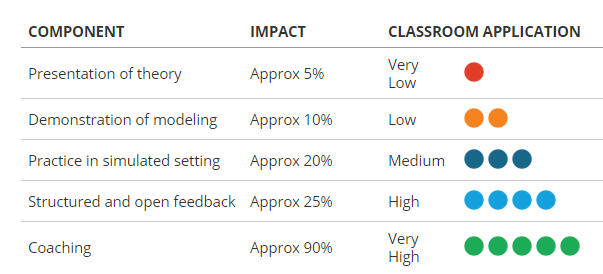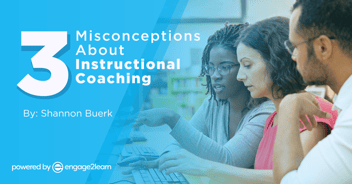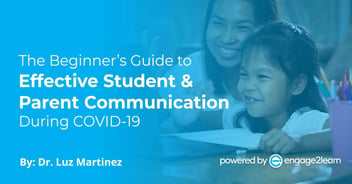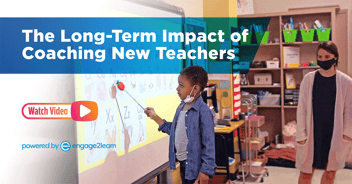Why Coaching Works Best to Grow Educators
Why Coaching?
For the past year, I have been trying to reach my health goals on my own. I’ve set a goal for how much weight I want to lose and muscle mass I want to gain. I then put an action plan into place to reach that goal. However, I’ve been unsuccessful in reaching my goal because frankly, I don’t have all of the resources or knowledge to do it on my own. It’s not that I’m not motivated, but after much reflection, I realized that I need a coach to provide the necessary encouragement, accountability, and expertise to help me reach my goals. So, I signed up for a personal health coach and have been receiving coaching for eight weeks now.
The coach started by first building a relationship with me. Then she helped me set my goals, do InBody testing to determine my current state, and then helped me develop a plan to reach my goals. Along the way, she has provided encouragement, feedback, and accountability through weekly check-ins.
After only eight weeks, I have seen significant progress towards reaching my health goals. I have lost weight, gained energy, and am sleeping better. My coach has helped me to efficiently and effectively stay on track towards reaching my goal.
So, does the same principle of having a coach to help us reach our personal goals work for educators, too? If a teacher, instructional coach, or leader wants to grow professionally, is going it on their own the route to take or would they benefit more from the encouragement, expertise, resources, and accountability a coach might provide? Will job-embedded coaching lead to realizing the educator’s goals?
I know from my own personal experience as both an athlete, mom, and teacher that, when the given job-embedded coaching, I can feel confident with the resources provided during coaching to make the necessary adjustments to improve on my practice and ultimately reach my goals. But you don’t have to take my word that coaching works, look at the research to see for yourself.
Dr. Bruce Joyce and Beverly Showers conducted a study in which they named five factors, (1) presentation of theory, (2) demonstration of practice, (3) practice in a simulated setting, and (4) structured and open feedback, and (5) coaching that contribute to learning for educators. Their research shows that structured and open feedback and coaching are more effective in impacting the classroom than the others.

In their research, Joyce and Showers emphasize coaching and training implementation, the impact of coaching on changing behavior for educators and producing results for learners: “Teachers who had a coaching relationship, practiced new skills and strategies more frequently and applied them more appropriately,” while “…students benefit when their teachers learn, grow, and change,” (2002).
In addition to Joyce and Showers research, Matthew A. Kraft, David Blazar, and Dylan Hogan did a meta-analysis in 2016 on the effects of teacher coaching on instruction and achievement. According to their article, The effect of teaching coaching on instruction and achievement: A meta-analysis of the causal evidence, “Effects on achievement also are larger than pooled estimates from 27 causal studies of almost all other school-based interventions reviewed by Fryer (2017) including student incentives, teacher pre-service training, merit-based pay, general PD, data-driven instruction, and extended learning time.” Based on this research, it seems school districts would gain a better return on their investment by spending money on teacher coaching instead of training.
This and many more research studies are why at engage2learn (e2L), over the past eight years, coaching has been the emphasis of professional learning. e2L only facilitates training for a district if it is followed by coaching due to the research on effective transfer of practice into the classroom.
What are educators saying who have implemented coaching systems?
In 2015, Mesquite ISD had the vision to implement the Read, Play, Talk initiative to reach the goal of having early learners reading on grade level by 3rd grade. Mesquite ISD Superintendent, Dr. David Vroonland, knew in order to reach the goal, he would need a partner to help support district educators in making the culture shift from one of compliance to ownership. Therefore, Dr. Vroonland partnered with e2L and invested in e2L’s evidence-based coaching model, the eGROWE Coaching Model, for leaders, teachers, and literacy coaches alike. During a 3-year rollout, which extended from the 2015-2016 academic year to the 2018-2019 academic year, 120 prekindergarten through second-grade classrooms implemented the Mesquite ISD Literacy Framework each year. Classroom teachers were provided with seven individualized, job-embedded coaching sessions with an e2L Certified eGROWE coach in Year 1 and six sessions in Year 2. The initial responsible rollout has now been extended to include upper elementary, middle, and high school classrooms for a more significant impact upon learner achievement and engagement through the Mesquite ISD Learning Framework.
“What we are doing is creating a model that centers around building capacity of teachers, while allowing the teachers to still be the Owner & Innovator of what needs to occur in that classroom.” -Dr. David Vroonland, Superintendent
The results have been amazing: e2L-coached classrooms now have 87.19% of their second-grade students reading on grade level compared to 78.13% in non-coached classrooms. Furthermore, students categorized as “at-risk” by Response to Intervention (RtI) standards in Mesquite ISD are moving from Tiers 3 and 2 to Tier 1 due to the strong foundation of Tier 1, highly-differentiated instruction of the Mesquite ISD Literacy Framework and job-embedded coaching.
In 2017, 268 Kindergarten students who entered school in Mesquite ISD as “at-risk” learners exited 1st grade on grade level! In 2019, Rutherford ES saw substantial gains in all subjects/grade levels with a 5.8% increase in approaches, an 8.6% increase in meets, and an 8.3% increase in masters, moving their campus designation from Improvement Required to a B school! Read the entire Rutherford story through the e2L Blog: The One-Year Turnaround Story, and hear what the Mesquite teachers had to say about coaching through the video, The Power of Coaching.

Mesquite ISD Literacy & Student Achievement Results
Not only has coaching built internal capacity in Mesquite ISD but it has also provided the support teachers need to grow to design high-quality learning experiences for students in Winters ISD. In 2018, Winters ISD partnered with e2L to design a Learning Innovation Framework (LIF©) called the Winters Learning Framework. This design was a way to implement blended learning in every classroom in the district and ensure every learner has the opportunity to acquire the skills necessary to be a successful contributor to society. Winters began with rolling out the framework to 6-8 grade teachers in all core subjects and high school English Language Arts teachers in Year 1. Winters provided job-embedded support for those teachers through e2L personalized coaching. Every teacher received seven individual coaching conversations and seven classroom visits. According to Kristen Peters, a new middle school math teacher, “The consistency of having a coach has been invaluable because she understands that I’m still developing, while gently nudging me toward my goals.” As a result of the coaching, Winters saw teacher growth in best practices aligned to their framework and student achievement results followed.


“The Winters Learning Framework has provided clarity on how to design learning experiences for students to prepare them academically and for the future they desire.” – Kathy Horner, Winters ISD, Secondary Principal.

Tools and Resources
Both the research, testimonials and results point toward the positive effects coaching has on learning and achievement. If you are interested in learning more about coaching and need somewhere to get started, check out these resources that e2L has to offer.



